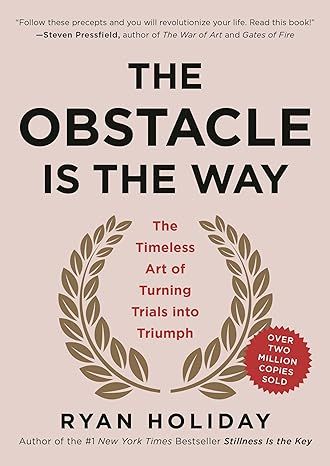The Obstacle Is the Way: The Timeless Art of Turning Trials into Triumph
4.6 out of 5
28,125 global ratings
#1 Wall Street Journal Bestseller
The Obstacle is the Way has become a cult classic, beloved by men and women around the world who apply its wisdom to become more successful at whatever they do.
Its many fans include a former governor and movie star (Arnold Schwarzenegger), a hip hop icon (LL Cool J), an Irish tennis pro (James McGee), an NBC sportscaster (Michele Tafoya), and the coaches and players of winning teams like the New England Patriots, Seattle Seahawks, Chicago Cubs, and University of Texas men’s basketball team.
The book draws its inspiration from stoicism, the ancient Greek philosophy of enduring pain or adversity with perseverance and resilience. Stoics focus on the things they can control, let go of everything else, and turn every new obstacle into an opportunity to get better, stronger, tougher. As Marcus Aurelius put it nearly 2000 years ago: “The impediment to action advances action. What stands in the way becomes the way.”
Ryan Holiday shows us how some of the most successful people in history—from John D. Rockefeller to Amelia Earhart to Ulysses S. Grant to Steve Jobs—have applied stoicism to overcome difficult or even impossible situations. Their embrace of these principles ultimately mattered more than their natural intelligence, talents, or luck.
If you’re feeling frustrated, demoralized, or stuck in a rut, this book can help you turn your problems into your biggest advantages. And along the way it will inspire you with dozens of true stories of the greats from every age and era.
224 pages,
Kindle
Audiobook
Hardcover
Paperback
Audio CD
First published April 30, 2014
ISBN 9781591846352
About the authors
Ryan Holiday
Ryan Holiday is one of the world's bestselling living philosophers. His books like The Obstacle Is the Way,Ego Is the Enemy,The Daily Stoic, and the #1 New York Times bestseller Stillness Is the Key appear in more than 40 languages and have sold more than 5 million copies. Together, they've spent over 300 weeks on the bestseller lists. He lives outside Austin with his wife and two boys...and a small herd of cows and donkeys and goats. His bookstore, The Painted Porch, sits on historic Main St in Bastrop, Texas.
Read more
Reviews
David Mannering
5
Best book for attorneys, businessmen, athletes, and for anyone facing a trial in their life.
Reviewed in the United States on July 18, 2024
Verified Purchase
I love this book, I first listened to it on audible then read the hard back version about a year and a half later. The first time I listened it was right around when my dog died suddenly one day with the groomer. I was beside myself, but this book helped reframe my mindset to turn that obstacle into a precipice for change in my life. I came back to it about year and half later while waiting for the release of Right Thing, Right Now, at the same time in the midst of reading the first section I was called to trial (I’m at attorney). It was my first solo trial, no second chair, no help, but I was able to use the lessons, which have been passed down for a couple thousand of years, to lean into the challenge presented as a pathway to be creative, resourceful, and accepting of the challenge which lead to significant advancements in my professional career.
Read more
8765
5
Read it again and again over the course of your life ... it'll have more meaning
Reviewed in the United States on August 11, 2024
Verified Purchase
There is no guarantee you'll like this. Your state of mind and readiness to find self awareness and clarity will determine what you hear in the messages the author puts forth.
I am in a unique point in my life at 45 where I found this to be just the series of messages I need to continue my life adjustments and become the "best version of myself."
Between this and "stillness is the key" - I've fueled my "meta cognitive tank" for the foreseeable future. And if I find it empty again, I'll know now that I've lost touch with these messages.
Read more
Peter Butler Jr.
5
Review: "The Obstacle is the Way"
Reviewed in the United States on June 13, 2020
Verified Purchase
The Obstacle is the Way is the first of a three-book series on the philosophy of Marcus Aurelius and other Stoic philosophers. “Stoicism” has a bad name in modern times, but the name has been corrupted in a similar way to how the name “Puritan” has been corrupted. Stoicism is – in many ways – what we now call Cognitive Behavioral Training.
In this volume, Ryan Holiday introduces the reader to three wide themes of Stoic philosophy – and this is a practical and easy read – don’t worry.
The first theme is perception. In this, the Stoics said to look at your situation – what is happening – as objectively as you can. What is this really? Putting aside emotions and presuppositions – What do I actually have here, and can I turn it into a positive? (This is not positivity thinking but turning whatever is before you over – looking at it from every angle, understanding what is truly is and from what perspective it is good, bad, or neutral.)
Once you have an objective understanding of what is before you, you then ask what is in my power and what is not in my power? What can I change and what can’t I change?
The second theme is action. That is directed action. This is a planned action to remove the obstacle in front of you and/or to transform it into the way in which you want to go. You set you actions and keep doing more, because there is always more that can be done. That does not mean there is no rest – you need to take action to rest, as well.
“Persist in your efforts. Resist giving in to distractions, discouragements, or disorder” (80). Do your job and do it right.
The third theme is will. “Will is our internal power, which can never be affected by the outside world” (125). This means to “bear and forebear. Acknowledge the pain but trod onward in your task” (131). This is the process of saying, I will do this and then I will do this, and so forth until my goal is accomplished. There is no giving up.
It is also to accept that no matter how well we perceive, no matter what actions we plan, we may fail to achieve what we desire. The biggest realization to keep before us is that we will die – we are finite creatures. Eventually, no matter how well we perfect perception, action, and will, we die. It just is. It is something we must accept. We are not to be morbid about it, rather we accept it as truth.
In the end, if we perceive the obstacles rightly and considered what we can do and what we cant’t do, and then we set up a plan of action and act upon it, and we persist and will our way towards the goal, we will always be happy, because there is nothing more we can do. We will have done everything.
The book ends with an extensive “selected” bibliography and recommended reading list, as well as ways to get in contact with the author.
I am finding Stoicism to be helpful in working forward in my life. I am also using his book, The Daily Stoic, which are short primary readings and commentary, as a devotional. And I look forward to reading the other two books in the series.
[This review appears on my blog, my YouTube channel, Amazon.com, and Goodreads.com.]
Read more
22 people found this helpful
Amazon Customer
5
Great Read!
Reviewed in the United States on August 10, 2024
Verified Purchase
I got this book, read through it as fast as I could, then bought 2 additional copies as gifts. Great messages of perseverance and mindset accompanied by historical examples to put each point in perspective.
Clubber Lang
5
Ryan Holiday? Great book if you want to learn. Not a book for people who believe in "The Secret".
Reviewed in the United States on May 25, 2014
Verified Purchase
While I know Ryan personally, I believe that I am uniquely qualified to review this book and, after reading a lot of the comments, add to the discussion. A lot of people miss that Ryan is articulating a journey and is translating it into something edible and powerful. Something 99% of us at ANY age cannot do, even with "wisdom of experience".
Storytelling has been around since the beginning of time, but actual mass communication has been around for a very short time (relatively). It looks as if the "paper book" business will become a specialty- if surviving at all. I know that Ryan knows this as he has always been quick to lend an idea, do some digging and most important- analyze and decide. As he uses as an example in his book, he pulls an Amelia Earhart and ACTS. He can talk about Tesla in the same sentence as popular games on the meat markets in early Chicago. He has read (studied) Marshall McLuhan to Malcolm Gladwell. This rabid quest to find out and face his own soul searching path- has delivered a perfect book for the RIGHT PERSON. This is not Chicken Soup for the Soul.
Ryan has done WAY more and influenced WAY more decisions than he would ever talk about, but has helped untangle talent and communication complications (i.e- market properly) using many of his methods he developed under Robert Greene and even 50 Cent and Tucker Max. He helped in stealth, but in critical ways, to launch, maintain and capitalize on #1 Films, TV Shows, YouTube and MANY multi platinum musical artists. I can vouch for it myself.
It is always amazing to read a review somewhere when that person has never faced down rejection and fear and can criticize anyone for at least putting their thoughts and ideas out there for judgment. To do that, when the WORLD is telling you that finishing college is the only way to go and you have the same people close to you saying that you will fail- it truly was an Obstacle to overcome. It only got more intense for Ryan, but his lessons are earned. He was led to the water, but unlike most people, he drank. How can you question the message, integrity and courage of that? Steven Pressfield, one of our generations best and most diverse authors, has called it "The Resistance". Even he endorsees the book on the dust jacket.
The reason that I preface the review this way is to show you Ryan's true accomplishment here- articulating what he has learned, applying it to clear examples people can remember and also help people. There have been big choices in Ryan's life- not the least of which was whether to go in house for a safe "job" or "bet on himself". He DID what he talks about here. It is the true reflection on a part of his life and the methods HE used to combat them. This is especially important for a generation who "has ADD" and can't relate to the past. At 22- I think it would be silly to not monitor this refreshing voice and mind as he progress'. He actually went and spent time with Dr. Drew after reading his not so best selling books.
Marcus Aurelius is the clear hero in this book, being compared to boxer "Hurricane" Carter (among others), while dealing with your internal power. The ideas and themes of the book seem to come from some Herman Hesse and Tom Wolfe as much as out of print magazines and long dead historical stars of their time. That is what is so attractive. Anyone should find a part of this to relate to. This is especially helpful to someone who wants a quick boost of intellect instead of trying to muscle through a biography (but he def refers to a lot of interesting people I need to read more about). Ryan does not rely on the same tired stereotyped figures from the past, but finds new, more relatable, characters and situations. Athletes, Entrepreneurs, Parents and CEO's, and those looking to look at life in a certain lens, will benefit greatly.
Think you are having a bad day? Open your eyes and you will find out that another historical leader (other than Churchill) suffered severe depression while running the country that may or may not exist depending on his choices- Abraham Lincoln (didn't see a lot of that in the movie). Grant, Nietzsche and Edison all make a story about fortitude and acceptance. A much different approach than looking in a window and imaging you will get the new purse that is in there and moving on. Again- this is intended for action and not philosophy.
Self Help crap would be fine if it worked, but that means there would only be one book- and it would work. Awareness. Dealing with fear and uncertainty. Mindful and deliberate. Shame and guilt. Accountability and results. How did other people deal with this? Only through careful research do these stories become just as powerful to the man who believes that history is a verb as they are to someone just trying to make it through their day.
The point is- you are not alone. In fact, you are not even close to being the first person today to experience multiple obstacles. It is comforting to see how adversity has been confronted in the past. This is a book for those who believe in Realpolitik and seeing life for what it is. I would say it is the actual back up action plan to what a mystical book like the Mayan based best seller, "The 4 Agreements", is. Although the book is very much based on stoic principles it makes no judgements about your belief system in a macro way.
I can see how this book can have some legs for people try to cope with a new world where you have too much or think you have too little- information to ingest. It is a reference book that can be returned to over and over.
Ryan Holiday is an important voice in the book space these days. Mostly because he is willing to actually commit to writing good books as well as growing his digital presence quickly. Non fiction at that age in 2014 is pretty impressive and patient. He can deal w Dov Charney, 50 Cent, Tucker Max and many others- due to his diversity. His "Read to Lead" mentality is refreshing and way more valuable than any class. He has a Best Seller in "Growth Hacking" at the same time, so holding his own with decades older armchair authors, while understanding the generation gap in communication is not such a bad way to describe this book.
And finally...yes- he uses the bible as reference at times..
Read more
98 people found this helpful
A. Lawrence
5
Great book
Reviewed in the United States on July 25, 2024
Verified Purchase
What a wonderful book! It is such a great, positive look at people's lives and how we can live ours
Kindle Customer
5
Power-UP!
Reviewed in the United States on July 15, 2024
Verified Purchase
This book is bite-sized and accurate. I have read a ton of self help books, leadership books, and great mind books like Sun Tzu. This book is well written and brings lasting truths into actionable ideas and pensive reveries I am very pleased I bought this book. A definite must for any leader looking to build his character and life.
Brittany Purpura
5
Great challenging book
Reviewed in the United States on August 10, 2024
Verified Purchase
This book is great for those who have a different out take on life or for those who want to expose their mind to a different way of thinking.
Ian Mann
4
Amazing, but never true
Reviewed in the United States on April 10, 2017
Verified Purchase
No doubt, you are trying to get ahead in whatever ‘getting ahead’ means to you. But so often an obstacle seems to stand in your way. Yes, there are a few people who report having planned their charmed life or their business success and had it unfold almost exactly as planned, and with style and elegance. Amazing, but never true. Most people blocked by the obstacles of time, money, connections, opportunity and more, do nothing. This book has a fascinating take on ‘being stuck’ – it is a primer on how to turn adversity to advantage, as the subtitle explains. Let me state upfront – I am bored by motivational talks and books. I find very little about them interesting or useful twelve hours later. This book is not a motivational text, though it is motivating as many good books are. The “Ancient Art” of the subtitle is referring to the wisdom and insight of the Stoic philosophers. These writings or thoughts influenced all the people Holiday uses as examples of this approach to obstacles of life. The circumstances of these people would leave most disoriented, reactive, torn and even paralyzed. As Holiday shows “some seem to turn those very obstacles, which stymie us, into launching pads for themselves.” Knowing that there are heroes doesn’t help us to become heroes, but knowing how they became heroes, does. The value of this book is that it offers an ancient and profound method and framework for understanding, appreciating, and acting in the face of the obstacles life throws at us. Turning obstacles into the way forward takes many forms. For the great Athenian orator, Demosthenes, it was a relentless drive to improve himself through action and practice. For Abraham Lincoln it was humility, endurance, and compassionate will. In each case, all the people cited in this book were not born with the attributes it took to succeed, and many faced unimaginable horrors, from imprisonment to debilitating illnesses, and of course the day-to-day frustrations we all endure. So, what did they do? “They had the ability to see obstacles for what they were, the ingenuity to tackle them, and the will to endure a world mostly beyond their comprehension and control,” Holiday explains. The perspective is not a self-delusional, positive and happy one, ‘this is not so bad’, but rather, ‘I can make this good’. The starting point is maintaining a state of mind that one of Holiday’s examples, the extraordinary businessman, John D. Rockefeller, had perfected: cool headedness and self-discipline. When America send the first astronauts into space, they trained them in one skill more than in any other: the art of not panicking. When people panic, they make mistakes. They just react, but not to what they need to react to, but to their survival hormones. At 150 miles above Earth, panic is suicide. Panic had to be trained out of the astronauts and it does not go easily. It must be trained away, through persistent, repeated attempts at not panicking, until you don’t. Talent isn’t the most important characteristic for success, grace and poise are, because these precede the opportunity to deploy your talent. The action after the panic allows for a change of perception that is a prerequisite for right action. George Clooney spent his first years in Hollywood getting rejected at every audition. He desperately wanted the producers and directors to like him, and they didn’t. He blamed them for not seeing how good he was. His life changed when he changed perspective, from self-centredness to that of other-centeredness, not possible in panic mode. Producers need to find the right actor to cast in their film, and they all hope that the next person to walk into the room is the right actor. When Clooney realized that he was the answer to their prayers, not the other way around, his performance improved and so did his career. Consider the refusal to fund your company. I could be an obstacle, or a call for a change of action. Getting the person to fund you this isn’t up to you, but the decision to refine and improve your presentation is. Consider the number of exceptional businesses started during depressions or economic crises. Fortune magazine was founded soon after the crash of 1929. Hewlett-Packard, and Revlon in the Great Depression. General Motors in the panic of 1907. Microsoft in the recession in 1973-75. LinkedIn during the burst of the dot-com bubble. Half the companies in the Fortune 500 were started under adverse conditions. Rather than focus on the difficulties of an economy in free-fall, they focused on what they needed to do to succeed, and that produced the difference. This difference requires presence of mind. Andy Grove, former CEO of Intel, said “Bad companies are destroyed by crisis. Good companies survive them. Great companies are improved by them.” In like fashion, great individuals find a way to transform weakness into strength. This is essentially a very practical book which will introduce you to a wealth of important ideas beyond what I have introduced in this column. They will be of extraordinary value as you try to facedown business crises.
Readability Light --+- Serious Insights High +---- Low Practical High -+--- Low
*Ian Mann of Gateways consults internationally on leadership and strategy and is the author of the soon to be released ‘Executive Update’.
Read more
188 people found this helpful
mikephd80
3
A poor man's Robert Greene
Reviewed in the United States on November 16, 2014
Verified Purchase
The premise of this book is great: instead of trying to avoid obstacles or complaining about them, embrace adversity and learn to thrive in spite of it. The first few pages were like an inspiring halftime talk from a football coach, and they had me excited and ready to take on the world. As I delved further into the book, I found that the principles of Stoicism are incorporated in a smooth, teachable manner (so I didn't feel like I was being lectured incessantly about Stoic philosophy) and each chapter starts out with a thought-provoking quote. The author's writing style is direct and easy to understand, and multiple times I found myself highlighting a phrase I found impactful.
In spite of these assets, I ultimately felt that the book fell short. Like his mentor Robert Greene, the author weaves in stories of famous historical figures to illustrate each lesson. Unlike Greene's books, however, I found this book's analysis to be quite superficial. For example, in the chapter titled "Channel Your Energy" the author brings up Toussaint Louverture, the fascinating individual who led the only successful slave insurrection in history that led to the creation of a nation. I was expecting an exciting tale from Louverture's life, yet the author simply referenced him for one paragraph to say that his name meant "the opening" because he was "fluid" and "uncontainable." That's it? Why even bother to bring him up? Many, many times the author would bring up a figure from the past only to mention a brief, shallow connection to the chapter's topic before re-engaging in his own pontification, which for the most part revolved around challenging the reader to stop "playing video games" and get off the couch. This might be good advice for some, but not every reader is sitting in front of a PlayStation wondering where life went wrong and awaiting a tongue-lashing from the author.
Although the writer has a good voice and I enjoyed his style, there were times where I thought the book could have benefitted from much better editing to tease out some of the fluff. When I read the phrase, "whatever you're doing, it's going to be harder if your plan includes defying physics or logic" I found myself thinking, "no kidding? I'm glad I paid money to read this."
Some of the stories were a little less than factual. Was Antietam a huge victory for the Union in the Civil War? It's been a while since I've taken a history course, but it was my understanding that Antietam is considered by most to have been a bloody stalemate. Also, the author made a good point about Obama handling the Reverend Wright fiasco pretty well with a great speech, but I think it's a stretch to say this "propelled" Obama into the White House.
I even found some of the author's statements to be contradictory. When describing Jack Johnson's boxing match against the Great White Hope, he said Johnson was "smiling, joking, playing the whole fight" in response to the racial tension of the crowd because "there's no value in any other reaction." Really? Well then why did you praise Joe Louis just a few chapters before for making a point to show no emotion at all during his boxing matches, also in regard to racial tension? Selectively choosing people or instances from history to back up your beliefs leads to inconsistencies, of which the book has many. Demosthenes is praised for not giving up and becoming a great orator, but Jefferson is praised for giving up on becoming a great orator and instead focusing on writing. Well, which is correct? If you want to succeed in politics and aren't a great orator, should you practice and never give up until you succeed, or acknowledge your weakness and focus on becoming a better writer? The truth is, there are many paths to success and ways around obstacles, so many of these so-called principles or rules make sense in one context and are valueless in another.
Even so, the author deserves credit for putting together a considerable list of great quotes, providing an overarching yet flawed framework for applying Stoicism to your daily life, and occasionally saying something inspiring that prompts the reader to action and inspires the belief that obstacles are not to be cursed but embraced and overcome.
Read more
237 people found this helpful
Top Ryan Holiday titles
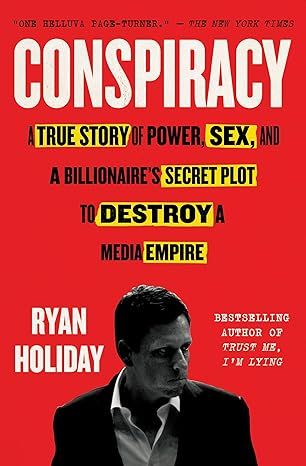
Conspiracy: A True Story of Power, Sex, and a Billionaire's Secret Plot to Destroy a Media Empire
4.3
-
1,965
$5.99
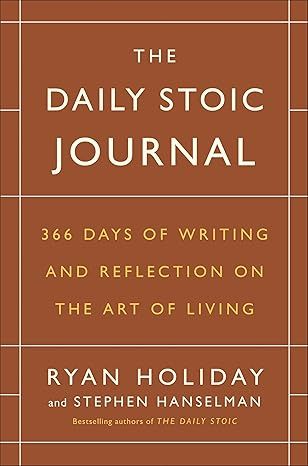
The Daily Stoic Journal: 366 Days of Writing and Reflection on the Art of Living
4.7
-
2,537
$15.99
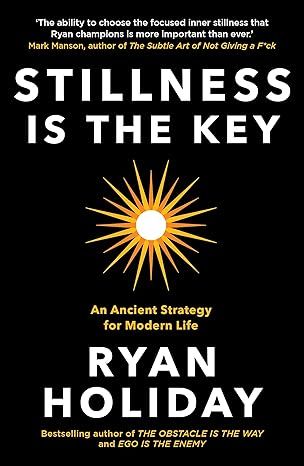
Stillness is the Key: An Ancient Strategy for Modern Life
4.7
-
9,966
$8.99
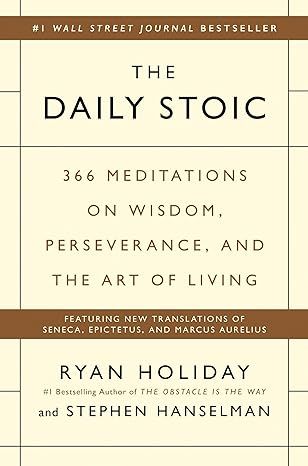
The Daily Stoic: 366 Meditations on Wisdom, Perseverance, and the Art of Living
4.8
-
32,641
$13.00
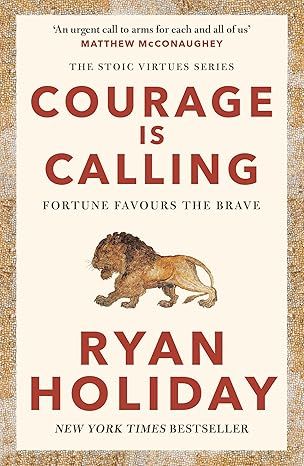
Courage Is Calling
4.6
-
4,763
$13.35
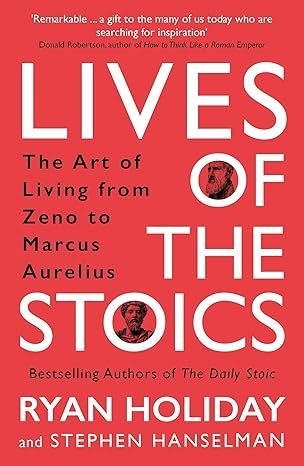
Lives of the Stoics: The Art of Living from Zeno to Marcus Aurelius
4.7
-
2,858
$8.99
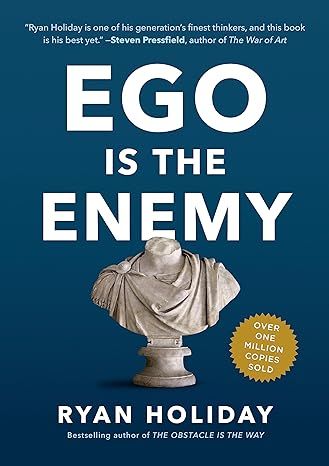
Ego is the Enemy: The Fight to Master Our Greatest Opponent
4.6
-
20,573
$11.99
Best Sellers

The Tuscan Child
4.2
-
100,022
$8.39

The Thursday Murder Club: A Novel (A Thursday Murder Club Mystery)
4.3
-
155,575
$6.33

Sapiens: A Brief History of Humankind
4.6
-
140,302
$13.49

The Butterfly Garden (The Collector, 1)
4.3
-
88,556
$9.59

Things We Hide from the Light (Knockemout Series, 2)
4.4
-
94,890
$11.66

The Last Thing He Told Me: A Novel
4.3
-
154,085
$2.99

The Perfect Marriage: A Completely Gripping Psychological Suspense
4.3
-
143,196
$9.47

The Coworker
4.1
-
80,003
$13.48

First Lie Wins: A Novel (Random House Large Print)
4.3
-
54,062
$14.99

Mile High (Windy City Series Book 1)
4.4
-
59,745
$16.19

Layla
4.2
-
107,613
$8.99

The Locked Door
4.4
-
94,673
$8.53
